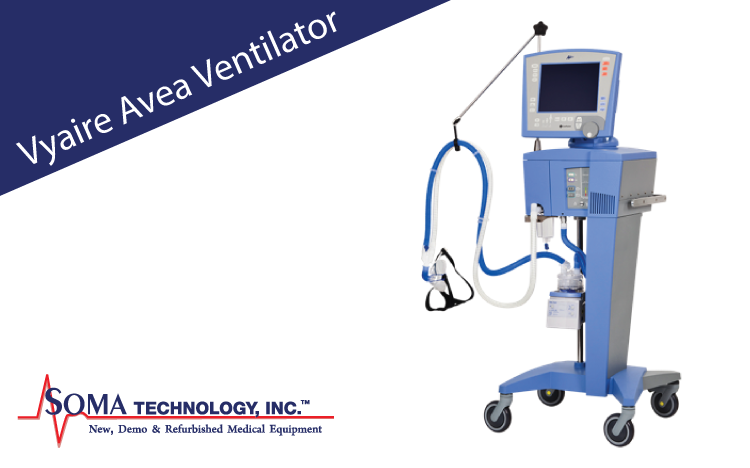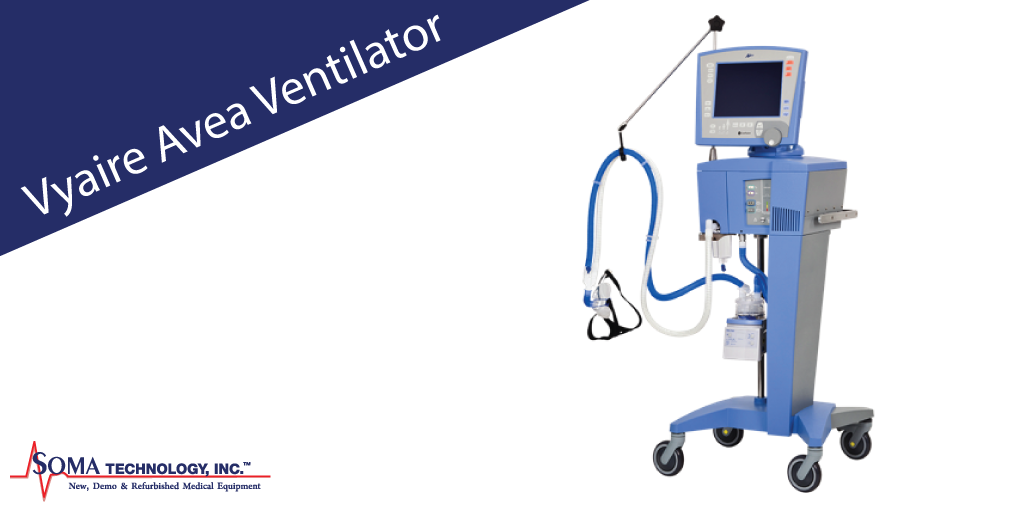Vyaire Avea Ventilator
January 11, 2018
Vyaire Avea Ventilator
The Vyaire Avea ventilator provides comprehensive critical care ventilation from adults with complex respiratory diseases, to the smallest patients in the NICU. The Avea meets the most demanding clinical needs with features such as invasive and noninvasive ventilation. It helps bring actionable information to help better address clinical and operational challenges in patient care. With the world of healthcare changing, clinicians face more pressure to deliver patients better care. The Avea features an array of clinical tools and advanced monitoring to help guide your patient through necessary care.
The Avea ventilator automates many of the routine tasks you face every day. This allows you to focus on what is most important for your patient. This ventilator features:
- Automated MIP/NIF, AutoPEEP, and Slow Flow maneuvers
- Programmable oxygen increase
- Artificial airway compensation
- Leak compensation
This ventilator provides a comprehensive array of modes and advanced features that keep facilities and clinicians focused on your patients, rather than the equipment. These modes include:
Volumetric Capnography
Volumetric capnography adds another key piece of information to provide improved monitoring of your patients’ condition. Tied with BiCore technology, this tool provides very powerful and comprehensive monitoring. Volume-based capnography includes:
- Advanced CO2 measurements
- Traditional time-based capnography
- Alveolar, anatomic and physiologic dead spaces
- Vd/Vt ratio, alveolar minute ventilation
Snow-flow Pflex
- One of 4 automated assessment maneuvers
- Low-inflection point calculation
- High-inflection point calculation
- Storage of 4 measurements for comparison
Accurate Tracheal and Esophageal Monitoring
- Measure the actual work imposed by the endotracheal tube
- Tracheal pressure monitoring
- Transpulmonary pressure monitoring
Transpulmonary Pressure Monitoring
Transpulmonary pressure monitoring is available on all comprehensive units for use on pediatric and adult patients. Transpulmonary pressure is a quantitative measurement of pressure required to inflate the lung. It aids the clinicians in the management of critically ill patients; in specifically setting the optimal PEEP and inflation pressure. Esophageal manometry, which helps to provide the transpulmonary pressure value. The Avea ventilator not only provides the esophageal measurements but calculates the transpulmonary pressure. When preparing the ventilator for transpulmonary pressure monitoring, you must enter the esophageal screen by selecting; screens, maneuvers, then esophageal. The ventilator will then ask you to select your balloon size.
The Avea Trifecta
Esophageal Pressure Monitoring
The Avea ventilator reduces the need to use extracorporeal membrane oxygenation (ECMO) by measure transpulmonary plateau pressures instead of plateau pressure. This ventilator utilizes PEEP titration to target positive transpulmonary pressure using an improved respiratory system compliance and the PaO2/FiO2 ratio.
Volumetric Capnography
High mortality in patients are commonly associated with early and sustained elevations in pulmonary dead space in patients with acute respiratory distress syndrome (ARDS). You can customize the Avea to display parameters such as:
- EtCO2
- VCO2
- VtCO2
- Vd ana
- Vd/Vt ana
- VA
- VD phy
- Vd/Vt phy
- Vd alv
- Oxygen index
- PaO2/FiO2 Ratio
Respiratory Knowledge Portal
This portal enables facilities to measure clinical and process variability in sedation and mechanical ventilation. It provides actionable information to help improve patient care. The information it proves is:
- Ventilator Weaning analytics
- Lung protective strategies analytics
- Alarm policy compliance analytics
- Ventilator-associated event (VAE) surveillance
- Sedation analytics
Vyaire Avea Specifications
The Vyaire Avea comprehensive ventilator has integrated BiCore technology for advanced pulmonary monitoring. Front-panel connection ports are provided for esophageal balloon catheters, tracheal catheters, and proximal flow sensors.
Dimensions
Pneumatic Module
Height: 10.5″ (26.7 cm)
Width: 16.75″ (43.2 cm)
Depth: 16″ (40.6 cm)
User-Interface Module
Height: 13.75″ (35 cm)
Width: 16.25″ (41.3 cm)
Depth: 2.5″ (6.4 cm)
Display (Diagonal): 12.1″
Resolution: 800 x 600
Weight
Ventilator With User-Interface Module
83 lbs (37.6 kg)
Ventilator and Compressor
90 lbs (40.8 kg)
Battery
1 hour of ventilator use on internal battery, or 30 minutes ventilator and compressor
4 hours of ventilator use on external battery, or 2 hours ventilator and compressor
Mode
Mode type: A/C, SIMV, CPAP/PSV, NPPV, and nCPAP/IMV
Breath type: APRV/BiPhasic, Volume, Pressure, TCPL, PRVC, and Volume Guarantee
Apnea backup: Volume, Pressure, and TCPL
Primary Settings
Rate: 1–150 bpm (neonatal, pediatric), 1–120 bpm (adult)
Tidal volume: 2.0 mL–2.5 L
Inspiratory pressure: 0–80 cmH2O (neonatal), 0–90 cmH2O (adult, pediatric)
Peak flow: 0.4–150 L/min
Inspiratory time: 0.15–5.0 sec
Pressure support ventilation (PSV): 0–80 cmH2O (neonatal), 0–90 cmH2O (adult, pediatric)
Explore Other Blog Items By Category
Recent Posts


Surgical Microscope Rentals


